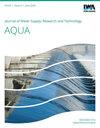Coagulant dosage prediction in the water treatment process
IF 4.3
Q2 Environmental Science
引用次数: 0
Abstract
Coagulation is an important water treatment step in a water treatment plant (WTP). Jar tests are performed to determine the required dose of coagulant; however, these tests are slow to be performed and do not give a response in real-time to changes in raw water quality that changes abruptly during the day. To overcome this limitation, this research developed artificial neural network (ANN) models, using full-scale WTP data that served to calibrate the model and then predict the coagulant dosage, considering raw water as data input, in compliance with the treated water quality parameters. The best model was able to predict the coagulant dosage with a mean squared error of 0.016 and a correlation coefficient equal to 0.872. These results corroborate to promote coagulant dosage automation in WTPs, making it clear that ANN models allow a faster response in dosage definition and reduce the need for human interaction in the process.水处理过程中混凝剂用量预测
混凝是水处理厂中一个重要的水处理步骤。进行瓶试验以确定所需的混凝剂剂量;然而,这些测试的执行速度很慢,并且不能对白天突然变化的原水质量的变化作出实时响应。为了克服这一局限性,本研究开发了人工神经网络(ANN)模型,使用全尺寸WTP数据对模型进行校准,然后根据处理后的水质参数,将原水作为数据输入,预测混凝剂的投加量。最佳模型预测混凝剂用量的均方误差为0.016,相关系数为0.872。这些结果证实了在wtp中促进混凝剂投加自动化,表明人工神经网络模型可以更快地响应投加剂量的定义,并减少了过程中对人工干预的需要。
本文章由计算机程序翻译,如有差异,请以英文原文为准。
求助全文
约1分钟内获得全文
求助全文
来源期刊
CiteScore
4.70
自引率
0.00%
发文量
74
审稿时长
4.5 months
期刊介绍:
Journal of Water Supply: Research and Technology - Aqua publishes peer-reviewed scientific & technical, review, and practical/ operational papers dealing with research and development in water supply technology and management, including economics, training and public relations on a national and international level.

 求助内容:
求助内容: 应助结果提醒方式:
应助结果提醒方式:


